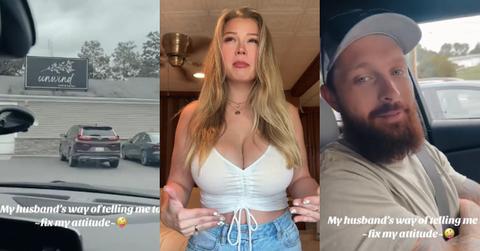Husband Takes His Wife to Her Favorite Coffee Shop to "Fix" Her Attitude
"The aggressive green flag energy lol."
Published Sept. 15 2024, 11:07 a.m. ET

A man's decision to nip an argument between him and his wife in the bud is cracking up TikTok and getting folks to write things like, "Awwww he really loves you."
Erin Sherman (@x_erinnicole) recorded her husband brusquely completing the kind gesture in a viral clip.
"My husband's way of telling me to fix my attitude," a text overlay in the video reads as the couple pulls up to a local coffee shop.
"I didn't know we were coming here?" Erin can be heard saying off camera while she records her husband driving.
The man, not speaking, looks straight ahead as the truck comes to a stop and he puts the vehicle in park.
"Why are we here?" she asks. Erin adds further context in a caption for the video, writing: "Unexpectedly pulls into my favorite coffee spot."
After asking her significant other why he decided to, out of the blue, bring her to her "favorite coffee spot," he gave a quiet reply while scratching his facial hair.
"You gotta do what's necessary sometimes."
His wife can be heard laughing from behind the camera. "What does that mean?"
The man doesn't seem to be interested in discussing the matter any further. Instead, he instructs her to enter the cafe to "go get a coffee," as the video ends.
His move seems reminiscent of the "anxiety chair" a man made for his wife when the two of them were planning their wedding. In the clip, he guides his better half into the room and lays down a litany of loving rules for her in the anxiety chair.

Modeling it after a scene from Inside Out 2, he highlights all of the little touches he made to ensure she had a haven she could enjoy whenever she was feeling overwhelmed. However, he also stipulated that she has to sit in the chair for at least 10 minutes.
Like Erin, the man in this video gives his wife a drink. And while it was a sweet and kind and doting thing that he did, he wasn't playing around when it came to the no cell phone rule.
He told her that she could watch TV while she was in the anxiety chair, but going on her phone was against the rules.
Now, Erin's TikTok video could probably be summed up as a relatable instance where one spouse, upon realizing the other woke up on the wrong side of the bed or is feeling "just a little treat" deprived.

But there's hard science pertaining to dopamine releases and coffee that prove the beverage can instantly boost someone's mood just by drinking it. The National Library of Medicine featured a study titled: "Caffeine Induces Dopamine and Glutamate Release in the Shell of the Nucleus Accumbens."
The same paper goes on the explain that consuming caffeine creates a dopamine response: "Systemic administration of behaviorally relevant doses of caffeine can preferentially increase extracellular levels of dopamine and glutamate."
Both dopamine and seratonin are two types of chemicals that are responsible for making the human mind happy. However, one is a more long haul monoamine neurotransmitter (seratonin) while the other is more like the sugar rush, quick fix type.

Nationwide Children's Hospital breaks it down: "Dopamine and serotonin are molecules that send signals throughout the body; these chemicals affect how we feel. When dopamine is released in our brain, we feel a sense of temporary pleasure. Serotonin, while similar to dopamine, creates a long-lasting feeling of happiness or well-being."
Perhaps the pursuit of these dopamine rushes, instead of cultivating/increasing serotonin levels in one's body, is why this Huffpost article questions if "little treat culture [has] gone too far?"
A UK-based psychologist in the study said: "Aover reliance on treats to get through the day can have implications, 'including becoming dependent on external rewards' and 'too much focus on short-term gratification."
They added that training one's psyche to rely on short-term rewards and seeking solace from highly pressurized situations can ultimately have negative implications.
"It can also have the potential to become normalized, taking the edge off the benefits as it becomes the standard way of operating."